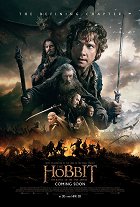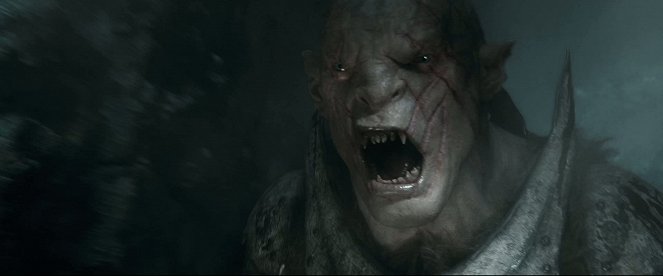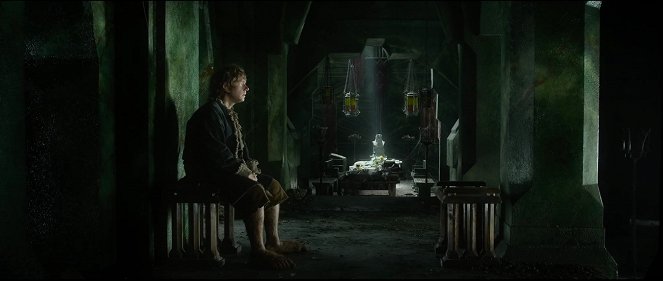Directed by:
Peter JacksonCinematography:
Andrew LesnieComposer:
Howard ShoreCast:
Martin Freeman, Ian McKellen, Richard Armitage, Luke Evans, Evangeline Lilly, Orlando Bloom, Hugo Weaving, Cate Blanchett, Christopher Lee (more)VOD (5)
Plots(1)
"The Hobbit: The Battle of the Five Armies" brings to an epic conclusion the adventures of Bilbo Baggins (Martin Freeman), Thorin Oakenshield (Richard Armitage) and the Company of Dwarves. The Dwarves of Erebor have reclaimed the vast wealth of their homeland, but now must face the consequences of having unleashed the terrifying Dragon, Smaug, upon the defenseless men, women and children of Lake-town. (Warner Bros. US)
(more)Videos (20)
Reviews (16)
The fact that I’m giving it one more star than the second part it’s not due so much to a better quality, but rather to the better mood I was in while watching it. Or maybe it was the more reasonable run, I don’t know. A plus is Thorin’s momentary episode of madness, a negative, is once again, the digital mess. Bilbo floats with the plot, the battle of the five armies breaks down into individual fights, and as a whole it goes nowhere. Once again I must say that adapting “The Hobbit” as a film trilogy was a very bad decision.
()
Spoilers ahead. You can’t take a film without an active protagonist, a strong antagonist and a sense of drive and turn it into a thrilling spectacle – not even if you have a dwarf riding a giant pig. It perhaps couldn’t have been any better thought out, but by dispensing with the trilogy’s most charismatic bad guy in the prologue, Jackson deprives the film of a more substantial final confrontation (and the effort to bring Smaug back into the film at least in Thorin’s hallucinations and Bilbo’s flashback doesn’t help much, since it’s obvious that neither of them will yield to the illusion of the dark side and they will both ultimately do the right thing). Though Bilbo’s transformation from a coward deprived of his domestic comforts has been satisfactorily completed (he acts on his own initiative, not only defying Thorin and Gandalf, but refusing to be controlled by the Ring), but during the battle he is still assigned to the role of a mere war correspondent and – as in the book – is unconscious through much of the battle. The sidelining of the hobbit also has a negative effect on the epilogue, which too briefly recapitulates the motif of the lost home and leaves us unsure of the way in which the adventures that the halfling experienced have changed him (has he become an even bigger homebody or has he realised that his home is not the only asset that he possesses?). Although The Battle is the shortest part of the trilogy, it most clearly shows us how much time Jackson allowed himself to tell the hobbit’s story (and leave the beloved Middle Earth). We are held in anticipation of the coming battle, which, however, serves primarily to draw our attention away from the lack of supporting or sufficiently developed storylines. For what purpose do Tauriel and Legolas journey to Gundabad? How does the Necromancer/Sauron contribute to the overall story (other than briefly entertaining Gandalf and creating a rickety donkey bridge to the Lord of the Rings)? What will become of Bard and his family? What was Gandalf’s (dramaturgical) contribution at the Lonely Mountain? It often seems that the flitting between the numerous characters and their personal quests serves only for forced parallels between the “old” and “new” trilogies. At the same time, it is an indication of the generally unfocused nature of the third Hobbit film. Several stories of individual characters clash in the film due to their incongruous natures (from slapstick to horror to heroic epic to intimate bromance), which make it hard to imagine that the whole film isn’t merely a matter of waiting for the battle (like the previous film “wasn't” just a matter of waiting for the dragon). The synthesis of these micro-episodes during the battle does not come across as a logical outcome of the preceding events, but rather as a case of “I happened to be passing by, so I joined in”. I found the inclusion of giant worms (if I remember correctly, no one even fights with them in the end) and eagles, which for Jackson are becoming a trademark similar to John Woo’s doves, to be equally random. What definitely doesn’t work, due to the weak development of the supporting characters, is the emotion displayed over the deaths of the less important dwarves (all except Thorin). I honestly cannot say which of them lived to see the end. What Jackson continues to excel at are the narrative action scenes that, despite tonnes of CGI and distinctly video-game “choreography” (Legolas skipping across falling rocks), radiate his enthusiasm for craftsmanship and inventing fantastical worlds and nations. Other than the two additional endings, The Battle of the Five Armies doesn’t offer any value added. It’s not a cheap, stupid or sloppily made film. It is a satisfactory film. Was it naïve to expect anything bolder from the conclusion of a perilously expensive fantasy project? 75%
()
(less)
(more)
This is how I imagine the fulfillment of the phrase "digital plague." Peter Jackson is diligently stealing from himself and showing that in the name of financial gain, he is capable of sinking low. The first Hobbit film already showed all his weaknesses by padding the plot with filler, and the inability to lead the storyline meaningfully, and the third film just tops it all off. Those who like attractions will enjoy the films but towards the end, I only felt resignation and disgust. Overall impression: 40%. I don't know how Tolkien would react to The Lord of the Rings films, but this piece of crap would surely hurt him...
()
I’m probably most disappointed about the shoddy battle with the dragon. Not that it doesn’t look good, but the unfortunate placing it in the intro steals its oomph and it’s too short. The battle of five armies which take up the longest sequences is of course technically sophisticated, in places even better than the Lord of the Rings, but is unnecessary long and fundamentally unimportant in itself. I didn’t have that feeling of inevitability. The best sequences are the humble chats between Bilbo and Thorin which gives some sense to the whole of part three. Part three suffers the most from being separated. It doesn’t work on its own and pointless things (like the vice mayor’s demented remarks) obscure what’s important (what happened to Bard after the battle?!). The sad farewell to the Middle-earth disappoints with its sloppiness.
()
I hesitated, I hesitated .. I give it a very shabby five stars and probably the weakest of the whole trilogy. As far as the plot and visual effects are concerned there is nothing to complain about, a precise job done in all aspects, as always, Jackson knows what he’s doing, but there were a few issues that I am not fully satisfied with. It bothers me a bit that the end of the trilogy is only two hours long, I wouldn't mind if the film was 40 minutes longer and explained more. There are a surprising number of logical errors, yes it's a fairy tale and fantasy and I never minded them, but the last 30 minutes seemed to be one logical error per minute, which seems to me to be over the top, considering that I didn't notice any errors in the previous installments. As for the development of Thorin, his obsession with gold was getting on my nerves and the war didn't go exactly as I would have liked, which is slightly disappointing, if all the nations had entered the mountain and defended it from the inside, I think it would have been much more spectacular, but these are minor things that distracted me slightly, it was an great experience anyway. 85%
()


